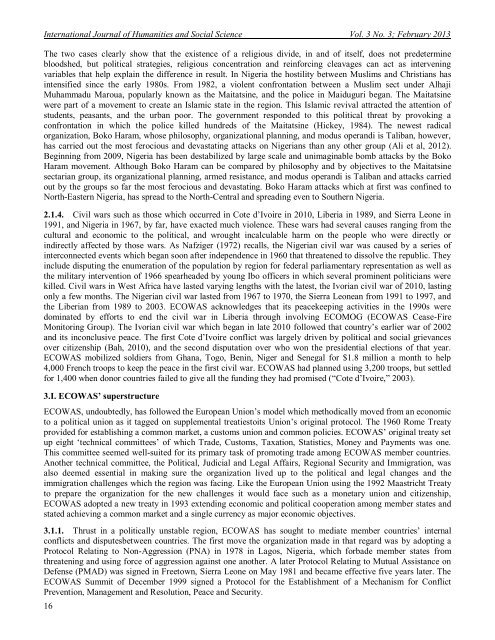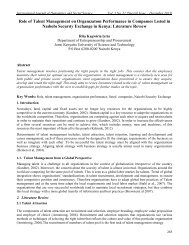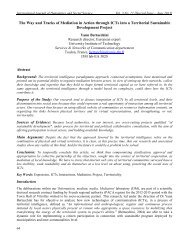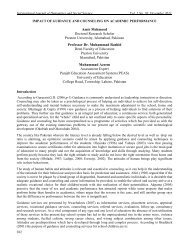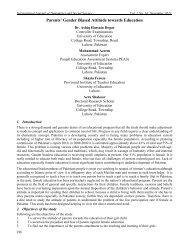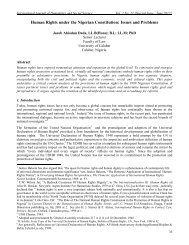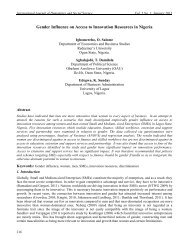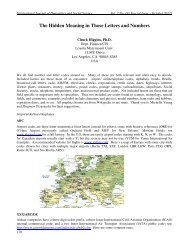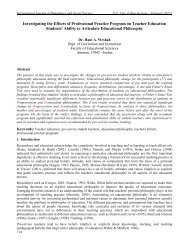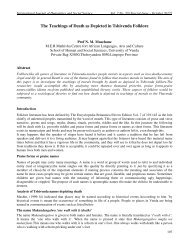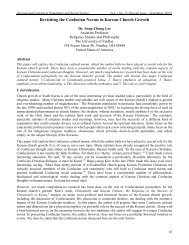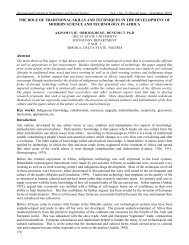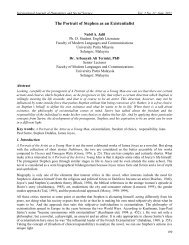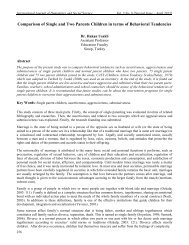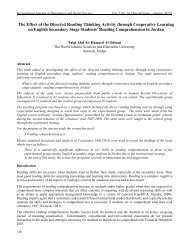The Political and Security Challenges Facing 'ECOWAS' in the ...
The Political and Security Challenges Facing 'ECOWAS' in the ...
The Political and Security Challenges Facing 'ECOWAS' in the ...
Create successful ePaper yourself
Turn your PDF publications into a flip-book with our unique Google optimized e-Paper software.
International Journal of Humanities <strong>and</strong> Social Science Vol. 3 No. 3; February 2013<br />
<strong>The</strong> two cases clearly show that <strong>the</strong> existence of a religious divide, <strong>in</strong> <strong>and</strong> of itself, does not predeterm<strong>in</strong>e<br />
bloodshed, but political strategies, religious concentration <strong>and</strong> re<strong>in</strong>forc<strong>in</strong>g cleavages can act as <strong>in</strong>terven<strong>in</strong>g<br />
variables that help expla<strong>in</strong> <strong>the</strong> difference <strong>in</strong> result. In Nigeria <strong>the</strong> hostility between Muslims <strong>and</strong> Christians has<br />
<strong>in</strong>tensified s<strong>in</strong>ce <strong>the</strong> early 1980s. From 1982, a violent confrontation between a Muslim sect under Alhaji<br />
Muhammadu Maroua, popularly known as <strong>the</strong> Maitats<strong>in</strong>e, <strong>and</strong> <strong>the</strong> police <strong>in</strong> Maiduguri began. <strong>The</strong> Maitats<strong>in</strong>e<br />
were part of a movement to create an Islamic state <strong>in</strong> <strong>the</strong> region. This Islamic revival attracted <strong>the</strong> attention of<br />
students, peasants, <strong>and</strong> <strong>the</strong> urban poor. <strong>The</strong> government responded to this political threat by provok<strong>in</strong>g a<br />
confrontation <strong>in</strong> which <strong>the</strong> police killed hundreds of <strong>the</strong> Maitats<strong>in</strong>e (Hickey, 1984). <strong>The</strong> newest radical<br />
organization, Boko Haram, whose philosophy, organizational plann<strong>in</strong>g, <strong>and</strong> modus oper<strong>and</strong>i is Taliban, however,<br />
has carried out <strong>the</strong> most ferocious <strong>and</strong> devastat<strong>in</strong>g attacks on Nigerians than any o<strong>the</strong>r group (Ali et al, 2012).<br />
Beg<strong>in</strong>n<strong>in</strong>g from 2009, Nigeria has been destabilized by large scale <strong>and</strong> unimag<strong>in</strong>able bomb attacks by <strong>the</strong> Boko<br />
Haram movement. Although Boko Haram can be compared by philosophy <strong>and</strong> by objectives to <strong>the</strong> Maitats<strong>in</strong>e<br />
sectarian group, its organizational plann<strong>in</strong>g, armed resistance, <strong>and</strong> modus oper<strong>and</strong>i is Taliban <strong>and</strong> attacks carried<br />
out by <strong>the</strong> groups so far <strong>the</strong> most ferocious <strong>and</strong> devastat<strong>in</strong>g. Boko Haram attacks which at first was conf<strong>in</strong>ed to<br />
North-Eastern Nigeria, has spread to <strong>the</strong> North-Central <strong>and</strong> spread<strong>in</strong>g even to Sou<strong>the</strong>rn Nigeria.<br />
2.1.4. Civil wars such as those which occurred <strong>in</strong> Cote d‟Ivoire <strong>in</strong> 2010, Liberia <strong>in</strong> 1989, <strong>and</strong> Sierra Leone <strong>in</strong><br />
1991, <strong>and</strong> Nigeria <strong>in</strong> 1967, by far, have exacted much violence. <strong>The</strong>se wars had several causes rang<strong>in</strong>g from <strong>the</strong><br />
cultural <strong>and</strong> economic to <strong>the</strong> political, <strong>and</strong> wrought <strong>in</strong>calculable harm on <strong>the</strong> people who were directly or<br />
<strong>in</strong>directly affected by those wars. As Nafziger (1972) recalls, <strong>the</strong> Nigerian civil war was caused by a series of<br />
<strong>in</strong>terconnected events which began soon after <strong>in</strong>dependence <strong>in</strong> 1960 that threatened to dissolve <strong>the</strong> republic. <strong>The</strong>y<br />
<strong>in</strong>clude disput<strong>in</strong>g <strong>the</strong> enumeration of <strong>the</strong> population by region for federal parliamentary representation as well as<br />
<strong>the</strong> military <strong>in</strong>tervention of 1966 spearheaded by young Ibo officers <strong>in</strong> which several prom<strong>in</strong>ent politicians were<br />
killed. Civil wars <strong>in</strong> West Africa have lasted vary<strong>in</strong>g lengths with <strong>the</strong> latest, <strong>the</strong> Ivorian civil war of 2010, last<strong>in</strong>g<br />
only a few months. <strong>The</strong> Nigerian civil war lasted from 1967 to 1970, <strong>the</strong> Sierra Leonean from 1991 to 1997, <strong>and</strong><br />
<strong>the</strong> Liberian from 1989 to 2003. ECOWAS acknowledges that its peacekeep<strong>in</strong>g activities <strong>in</strong> <strong>the</strong> 1990s were<br />
dom<strong>in</strong>ated by efforts to end <strong>the</strong> civil war <strong>in</strong> Liberia through <strong>in</strong>volv<strong>in</strong>g ECOMOG (ECOWAS Cease-Fire<br />
Monitor<strong>in</strong>g Group). <strong>The</strong> Ivorian civil war which began <strong>in</strong> late 2010 followed that country‟s earlier war of 2002<br />
<strong>and</strong> its <strong>in</strong>conclusive peace. <strong>The</strong> first Cote d‟Ivoire conflict was largely driven by political <strong>and</strong> social grievances<br />
over citizenship (Bah, 2010), <strong>and</strong> <strong>the</strong> second disputation over who won <strong>the</strong> presidential elections of that year.<br />
ECOWAS mobilized soldiers from Ghana, Togo, Ben<strong>in</strong>, Niger <strong>and</strong> Senegal for $1.8 million a month to help<br />
4,000 French troops to keep <strong>the</strong> peace <strong>in</strong> <strong>the</strong> first civil war. ECOWAS had planned us<strong>in</strong>g 3,200 troops, but settled<br />
for 1,400 when donor countries failed to give all <strong>the</strong> fund<strong>in</strong>g <strong>the</strong>y had promised (“Cote d‟Ivoire,” 2003).<br />
3.I. ECOWAS’ superstructure<br />
ECOWAS, undoubtedly, has followed <strong>the</strong> European Union‟s model which methodically moved from an economic<br />
to a political union as it tagged on supplemental treatiestoits Union‟s orig<strong>in</strong>al protocol. <strong>The</strong> 1960 Rome Treaty<br />
provided for establish<strong>in</strong>g a common market, a customs union <strong>and</strong> common policies. ECOWAS‟ orig<strong>in</strong>al treaty set<br />
up eight „technical committees‟ of which Trade, Customs, Taxation, Statistics, Money <strong>and</strong> Payments was one.<br />
This committee seemed well-suited for its primary task of promot<strong>in</strong>g trade among ECOWAS member countries.<br />
Ano<strong>the</strong>r technical committee, <strong>the</strong> <strong>Political</strong>, Judicial <strong>and</strong> Legal Affairs, Regional <strong>Security</strong> <strong>and</strong> Immigration, was<br />
also deemed essential <strong>in</strong> mak<strong>in</strong>g sure <strong>the</strong> organization lived up to <strong>the</strong> political <strong>and</strong> legal changes <strong>and</strong> <strong>the</strong><br />
immigration challenges which <strong>the</strong> region was fac<strong>in</strong>g. Like <strong>the</strong> European Union us<strong>in</strong>g <strong>the</strong> 1992 Maastricht Treaty<br />
to prepare <strong>the</strong> organization for <strong>the</strong> new challenges it would face such as a monetary union <strong>and</strong> citizenship,<br />
ECOWAS adopted a new treaty <strong>in</strong> 1993 extend<strong>in</strong>g economic <strong>and</strong> political cooperation among member states <strong>and</strong><br />
stated achiev<strong>in</strong>g a common market <strong>and</strong> a s<strong>in</strong>gle currency as major economic objectives.<br />
3.1.1. Thrust <strong>in</strong> a politically unstable region, ECOWAS has sought to mediate member countries‟ <strong>in</strong>ternal<br />
conflicts <strong>and</strong> disputesbetween countries. <strong>The</strong> first move <strong>the</strong> organization made <strong>in</strong> that regard was by adopt<strong>in</strong>g a<br />
Protocol Relat<strong>in</strong>g to Non-Aggression (PNA) <strong>in</strong> 1978 <strong>in</strong> Lagos, Nigeria, which forbade member states from<br />
threaten<strong>in</strong>g <strong>and</strong> us<strong>in</strong>g force of aggression aga<strong>in</strong>st one ano<strong>the</strong>r. A later Protocol Relat<strong>in</strong>g to Mutual Assistance on<br />
Defense (PMAD) was signed <strong>in</strong> Freetown, Sierra Leone on May 1981 <strong>and</strong> became effective five years later. <strong>The</strong><br />
ECOWAS Summit of December 1999 signed a Protocol for <strong>the</strong> Establishment of a Mechanism for Conflict<br />
Prevention, Management <strong>and</strong> Resolution, Peace <strong>and</strong> <strong>Security</strong>.<br />
16


